- Home
- David Gemmell
Quest for Lost Heroes
Quest for Lost Heroes Read online
“You are good with a rapier,” said Logar.
“I am better with a saber,” Chareos answered.
“In that case we will take no chances,” hissed Logar. “Kill him!”
Two swordsmen leapt forward. Chareos blocked a wild slash, spun to avoid a second thrust, and backhanded his blade across the first man’s throat. Blood spurted and the attacker fell, thrusting his fingers at the wound in a vain attempt to stem the flow of his life. The second attacker sent a cut at Chareos’ head, but he ducked. The swordsman fell back, eyes widening.
“Well?” Chareos glared at Logar.
Logar attacked. Chareos leapt back from a slice that would have disemboweled him. Then he swept a riposte that plunged into Logar’s groin, severing the huge artery at the top of the inner thigh. Logar stared at the blood drenching his leggings; then his legs gave way and he fell to his knees before Chareos. He blinked up at his killer before toppling to the ground …
By David Gemmell
Published by Ballantine Books
LION OF MACEDON
DARK PRINCE
ECHOES OF THE GREAT SONG
KNIGHTS OF DARK RENOWN
MORNINGSTAR
DARK MOON
IRONHAND’S DAUGHTER
THE HAWK ETERNAL
THE DRENAI SAGA
LEGEND
THE KING BEYOND THE GATE
QUEST FOR LOST HEROES
WAYLANDER
IN THE REALM OF THE WOLF
THE FIRST CHRONICLES OF DRUSS THE LEGEND
THE LEGEND OF DEATHWALKER
WINTER WARRIORS
HERO IN THE SHADOWS
WHITE WOLF
THE SWORDS OF NIGHT AND DAY
THE STONES OF POWER CYCLE
GHOST KING
LAST SWORD OF POWER
WOLF IN SHADOW
THE LAST GUARDIAN
BLOODSTONE
THE RIGANTE
SWORD IN THE STORM
MIDNIGHT FALCON
RAVENHEART
STORMRIDER
TROY
LORD OF THE SILVER BOW
SHIELD OF THUNDER
FALL OF KINGS
A Del Rey® Book
Published by The Random House Publishing Group
Copyright © 1990 by David A. Gemmell
All rights reserved.
Published in the United States by Del Rey Books, an imprint of The Random House Publishing Group, a division of Random House, Inc., New York. Originally published in Great Britain as a Legend Book, published by Arrow Books Limited, an imprint of Random House UK Ltd., in 1990.
Del Rey is a registered trademark and the Del Rey colophon is a trademark of Random House, Inc.
www.delreybooks.com
eISBN: 978-0-307-79747-6
v3.1
Dedication
Some men climb mountains or found empires; others make fortunes or create classics. But Quest for Lost Heroes is dedicated with love to Bill Woodford, who took on the role of stepfather to a shy, introverted, and illegitimate six-year-old boy and never once let him down. Through his patient encouragement, his quiet strength, and his endless affection he gave his son the pride and the confidence to fight his own battles—both in life and on the printed page. Thanks, Dad!
Acknowledgments
Grateful thanks also to Liza Reeves for the direction, Jean Maund for copy editing, and Tom Taylor, Stella Graham, Edith Graham, and Val Gemmell for the test reading.
Contents
Cover
Other Books by This Author
Title Page
Copyright
Dedication
Acknowledgments
Prologue
Chapter 1
Chapter 2
Chapter 3
Chapter 4
Chapter 5
Chapter 6
Chapter 7
Chapter 8
Chapter 9
Chapter 10
Chapter 11
Chapter 12
Chapter 13
Chapter 14
Chapter 15
Epilogue
Prologue
THREE MEN WERE down; the other four formed a half circle around the huge, ugly man in the bearskin jerkin.
“You want to know what it’s like on the mountain?” he asked them, his voice slurred. He spit blood from his mouth, which stained his red and silver beard. His attackers hurled themselves forward, and he met the first with a crashing blow to the chin that sent the victim sprawling to the sawdust-covered floor. Blows rained in on him. He ducked his bald head and charged at the remaining three, but his foot slipped and he fell, dragging a man with him. A booted foot lashed into his face, but he swung his arm to knock the man from his feet. The ugly man staggered upright and leaned back against the wooden counter, his eyes narrowing as two of his attackers drew daggers from their belts. Dropping his right arm, he pulled a long skinning knife from his boot. It was double-edged and wickedly sharp.
The innkeeper moved silently behind him, and the blow to the back of the ugly man’s neck was sudden. His eyes glazed. The knife dropped from his fingers, and he fell facedown to crash alongside his victims.
“I’ll cut his puking heart out,” said one of his attackers, moving forward.
“That would not be wise,” the innkeeper told him. “The man is a friend of mine. And I would be obliged to kill you.” The words were spoken softly but with a confidence that cut through the atmosphere of anger and sudden violence.
The man slammed his dagger home in its sheath. “Someone will kill him one day,” he said.
“Sadly, that is true,” the innkeeper agreed, opening the flap on the counter and kneeling beside the unconscious man in the bearskin. “Are your friends alive?”
Two of the men were groaning, and a third struggled to sit. “Yes, they’re alive. What was that nonsense about a mountain?”
“It’s not important,” replied the innkeeper. “There’s a pitcher of ale by the barrel. You’re welcome to it—and there’ll be no charge for your drinks this evening.”
“That’s good of you,” said the man. “Here, let me give you a hand with him.” Between them they hauled the ugly man upright and carried him through to a room at the rear of the inn, where a lantern burned brightly and a bed was ready, the sheets drawn back. They laid the unconscious warrior on the bed, and the innkeeper sat beside him. He looked up at his helper; all the man’s anger had disappeared.
“Go and enjoy your ale,” said the innkeeper. “My wife will bring it to you.”
After the man had gone, the innkeeper checked his friend’s pulse. It was beating strongly.
“You can stop pretending now,” he remarked. “We are alone.”
The ugly man’s eyes opened, and he eased himself up on the thick pillows. “I didn’t want to have to kill anyone,” he said, smiling sheepishly and showing a broken tooth. “Thanks for stopping it, Naza.”
“It was nothing,” Naza told him. “But why do you not let it rest? The past is gone.”
“I was there, though. I was on the mountain. No one can take that from me.”
“No one would want to, my friend,” Naza said sadly.
The ugly man closed his eyes. “It wasn’t what I dreamed of,” he said.
“Nothing ever is,” replied Naza, standing and blowing out the lantern.
Later, after Naza and his wife, Mael, had cleared away the tankards, pitchers, and plates and locked the doors, they sat together by the dying fire. Mael reached over and touched her husband’s arm; he smiled and patted her hand.
“Why do you put up with him?” asked Mael. “That’s the third fight this month. It’s bad for business.”
“He’s my friend.”
&nbs
p; “If he was truly your friend, he would not cause you so much grief,” she pointed out.
He nodded. “There’s truth in that, Mael, my love. But I feel his sadness; it hurts me.”
Moving from her seat, she leaned over to kiss his brow. “You are too softhearted. But that is one of the reasons I love you, so I won’t complain too much. I just hope he doesn’t let you down.”
He pulled her into his lap. “He will; he can’t help it. He climbed the mountain, and now he has nowhere to go.”
“What mountain?”
“The worst kind, Mael. The kind that first you climb and then you carry.”
“It is too late for riddles.”
“Yes,” he agreed, surging to his feet and holding her in his arms. “Let me take you to bed.”
“Which bed? You put your drunken friend in ours!”
“The upper guest room is free.”
“And you think you’re still young enough to carry me there?”
He chuckled and lowered her to the floor. “I could, but I think I’ll conserve what little strength I have for when we get there. You go up and light the lantern. I’ll be with you in a little while.”
He wandered back to his own room and pulled the boots from the sleeping man. A second knife clattered to the floor. Covering his friend with a blanket, he crossed the room.
“Sleep well,” he whispered, pulling the door shut behind him.
1
SEVENTEEN PEOPLE WATCHED the duel, and not a sound could be heard above the whispering of the blades and the discordant music of steel on steel. The earl rolled his wrist and sent a lancing stroke toward the face mask of his opponent, but the man dropped his shoulder and swayed aside, flashing a riposte that the earl barely parried. For some minutes the two duelists were locked in a strategic battle, then the earl launched a blistering attack. His opponent—a tall, lean man wearing the gray habit of a monk beneath his mask and mail shirt—defended desperately. With a last hissing clash the swords came together, the earl’s blade sliding free to touch the monk’s chest.
The duelists bowed to each other, and a light ripple of applause came from the spectators. The earl’s wife and three sons moved out onto the floor of the hall.
“You were wonderful, Father,” said the youngest, a blond-headed boy of seven. The Earl of Talgithir ruffled the boy’s hair.
“Did you enjoy the exhibition?” he asked.
“Yes, Father,” the boys chorused.
“And what was the move by which your father defeated me?” the monk asked, pulling off his mask.
“The Classic Chare,” replied the eldest.
The monk smiled. “Indeed it was, Lord Patris. You are studying well.”
The earl allowed his wife to lead his sons from the hall and waved away his retainers. With the hall empty, he took the monk’s arm, and the two men strode to the south gallery, where a pitcher of fruit juice and two goblets had been set aside.
The earl filled the goblets. “Are you really content here?” he asked.
The monk shrugged. “As content as I would be anywhere, my lord. Why do you ask?”
The earl gazed into the eyes of the man before him. The face he saw was strong, the nose long and aquiline, the mouth full below a trimmed mustache. “There are many legends concerning you, Chareos,” he said. “Some have you as a prince. Did you know that?”
“I have heard it,” Chareos admitted. “It is unimportant.”
“What is important? You are the finest swordsman I ever saw. You were one of the heroes of Bel-azar. You could have been rich beyond the dreams of common men.”
“I am rich beyond the dreams of common men, my lord. And that is what is important. This life suits me. I am by nature a student. The libraries here in Gothir are among the best anywhere. Far south, they say, the libraries of Drenan contain more books, but here are the complete works of Tertullus. It will take me many years to study them all.”
“It doesn’t seem right,” said the earl. “I remember my father putting me on his shoulder so that I could see the heroes of Bel-azar as they marched through the streets of New Gulgothir. I remember everything about that day. You were riding a white stallion of some seventeen hands and wearing a silver mail shirt and a helm with a white horsehair plume. Beltzer was behind you, carrying his ax. Then Maggrig and Finn. People in the crowd reached out to touch you as if you were a lodestar. It was a wonderful day.”
“The sun shone,” agreed Chareos, “but it was only a parade, my lord—and there are many parades.”
“What happened to the others?” asked the earl. “Did you remain friends? I have heard nothing of them for years.”
“Nor I,” Chareos answered. The dark-eyed monk looked away, seeing Beltzer as he had been on the last day: drunk, red-eyed, and weeping, his ax auctioned to settle his debts. The farmer had become a hero, and it had destroyed him in a way the Nadir could not. Maggrig and Finn had been there; they had left Beltzer alone in the back room of the inn and walked with Chareos out into the sunshine.
“We are going back to the mountains,” Finn had said.
“There’s nothing there,” Chareos had told him.
Finn had smiled. “There’s nothing anywhere, Blademaster.” Without another word the black-bearded archer had taken up his pack and moved off.
The youth Maggrig had smiled, offering Chareos his hand. “We will meet again,” he had said. “He probably only needs a little time to himself, away from crowds.”
“How do you suffer his moods and depressions?” Chareos had asked.
“I do not see them,” Maggrig had answered. “I see only the man.”
Now Chareos sipped his fruit juice and gazed out of the tall window. He was sitting too far back to see the courtyard and the gardens beyond. But from here he could look over the high wall of the monastery and off into the southern distance, where the forest lay like a green mist on the mountains. His gaze swept across to the east and the ridges of hills that led to the Nadir Steppes. For a moment only he felt the touch of icy fear.
“You think the Nadir will attack come summer?” asked the earl, as if reading his thoughts. Chareos considered the question. The Nadir lived for war—a dour, nomadic tribal people, joyous only in battle. For centuries Gothir kings had held them in thrall, sure in the knowledge that the tribes hated one another more than they detested the conquerors. Then had come Ulric, the first great warlord. He had united them, turning them into an invincible force, an army numbering hundreds of thousands of fierce-eyed warriors. The Gothir were crushed and the king slain, and refugees fled to the northwest to build new homes. Only the great Drenai citadel of Dros Delnoch, far to the southeast, had turned them back. But a century later another warlord arose, and he would not be thwarted. Tenaka Khan had crushed the Drenai and invaded the lands of Vagria, his armies sweeping to the sea at Mashrapur and along the coastline to Lentria. Chareos shivered. Would they attack this coming summer? Only the Source knew. But one point was as certain as death—one day the Nadir would come. They would sweep across the hills, their battle cries deafening, the grass churned to muddy desolation under the hooves of their war ponies. Chareos swallowed, his eyes fixed to the hills, seeing the blood-hungry hordes flowing across the green Gothir lands like a dark tide.
“Well?” queried the earl. “Do you think they will attack?”
“I could not say, my lord. I do not listen to the reports as once I did. It is said that the Drenai are in rebellion again, led by yet another who claims to be the Earl of Bronze reborn. I think that makes it the fifth in the thirty years since Tenaka Khan stormed Dros Delnoch. But perhaps such an uprising will put off the Nadir plans.”
“He went the way of all the others,” said the earl. “He was caught and crucified; the rebellion was crushed. It is said the new khan has ordered his troops north.”
“People have been saying that for years,” said Chareos. “There is little here for them. The spoils they took from the conquests of Drenan, Vagria, and Lentria made the
m rich. We have nothing to offer them; we are not even a gateway to richer kingdoms. Beyond New Gulgothir is the sea. Perhaps they will leave us alone.” Even as he spoke, Chareos felt the lie sitting cold in his throat. The Nadir lived not for plunder but for blood and death and conquest. It would matter nothing to them that the riches were few. No, they would be fired with thoughts of ancestral revenge on the Gothir people.
“You do not believe that, Blademaster. I see it in your eyes,” said the earl, standing. “No, the Nadir hate us for the past, and they are tormented by the memory of Bel-azar, the only defeat to stain the reputation of Tenaka Khan.”
Chareos rose and assisted the earl into his caped coat. He looked into the younger man’s face. “Bel-azar was a miracle. I do not know how we did it or why Tenaka Khan allowed us to hold. But it was twenty years ago; I very rarely think of it now.”
“The old fortress is in ruins,” the earl said. “It’s as good as Nadir territory now. Thank you for the lesson. I think I am getting closer to you.”
“Better than that, my lord. You beat me today.”
“Are you sure you did not let me win just because my sons were watching?”
“You won fairly, my lord. But next week I will be better.”
“Next week you come to the castle. Afterward we will ride out into the Hunting Woods and see if we can flush out a boar or two.”
Chareos bowed as the earl strode from the hall. There was still some juice in the pitcher, and he refilled his goblet and wandered to the window, watching as the earl’s retinue rode from the monastery.
It had been a long time since those names had been voiced: Beltzer, Maggrig, and Finn. He could still see the red-bearded giant hammering his battle-ax into the Nadir as they swarmed over the gate tower wall. And each evening the bowmen, Maggrig and Finn, would compare scores and write them in charcoal on the granite wall: “Maggrig killed eleven today, making his tally thirty-one. Death to the Nadir!” Old Kalin would dispute their figures as he cooked the evening meal over the brazier. Such a way with food, that man, Chareos remembered—he could make sirloin steak taste like sheep’s bowels. He had died on the last day.

 Bloodstone
Bloodstone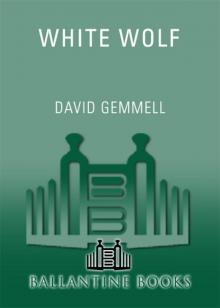 White Wolf
White Wolf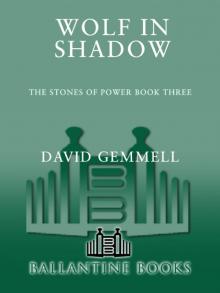 Wolf in Shadow
Wolf in Shadow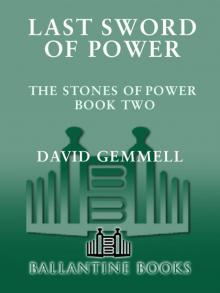 Last Sword of Power
Last Sword of Power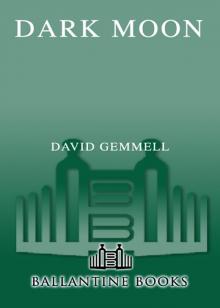 Dark Moon
Dark Moon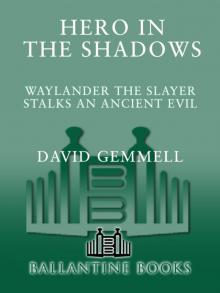 Hero in the Shadows
Hero in the Shadows Gemmell, David - Drenai 09 - Hero In The Shadows
Gemmell, David - Drenai 09 - Hero In The Shadows Waylander
Waylander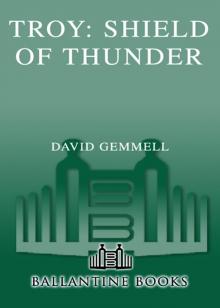 Shield of Thunder
Shield of Thunder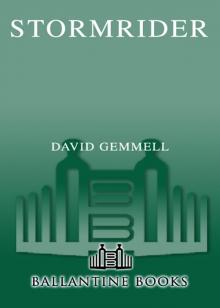 Stormrider Stormrider
Stormrider Stormrider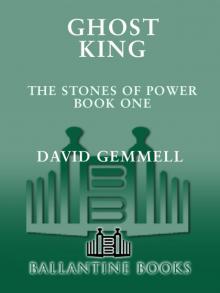 Ghost King
Ghost King Legend
Legend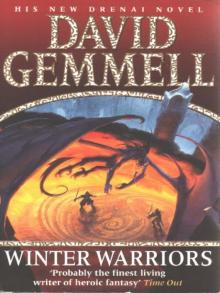 Winter Warriors
Winter Warriors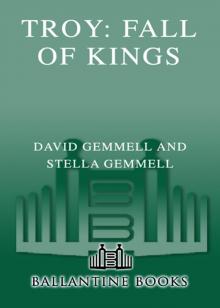 Fall of Kings
Fall of Kings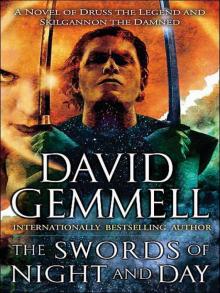 The Swords of Night and Day
The Swords of Night and Day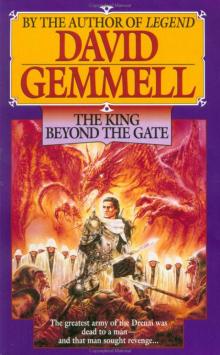 The King Beyond the Gate
The King Beyond the Gate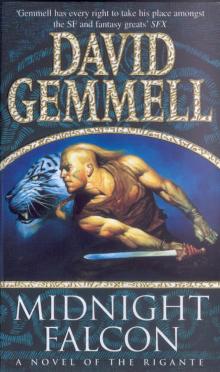 Midnight Falcon
Midnight Falcon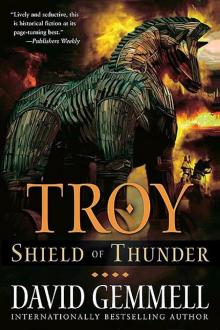 02 - Shield of Thunder
02 - Shield of Thunder In the Realm of the Wolf
In the Realm of the Wolf Ravenheart
Ravenheart The First Chronicles of Druss the Legend
The First Chronicles of Druss the Legend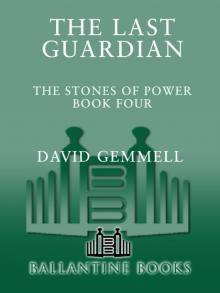 Last Guardian
Last Guardian Stormrider
Stormrider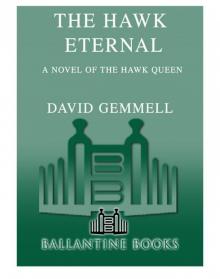 The Hawk Eternal
The Hawk Eternal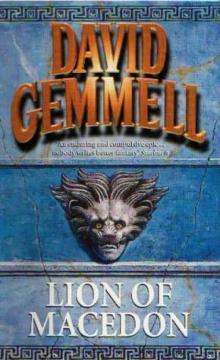 Lion of Macedon
Lion of Macedon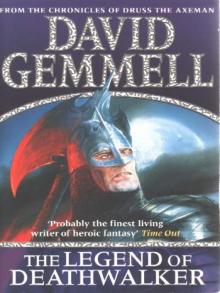 The Legend of Deathwalker
The Legend of Deathwalker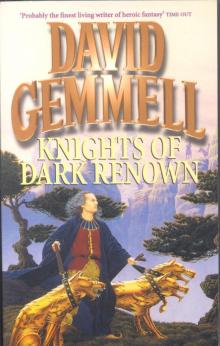 Knights of Dark Renown
Knights of Dark Renown Echoes of the Great Song
Echoes of the Great Song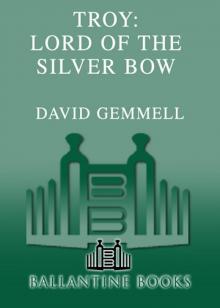 Lord of the Silver Bow
Lord of the Silver Bow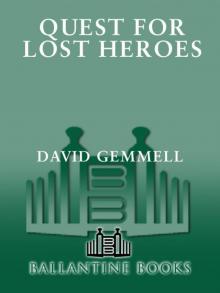 Quest for Lost Heroes
Quest for Lost Heroes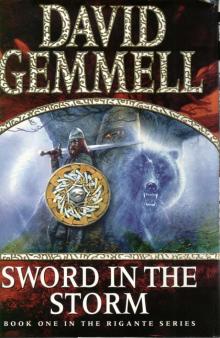 Sword in the Storm
Sword in the Storm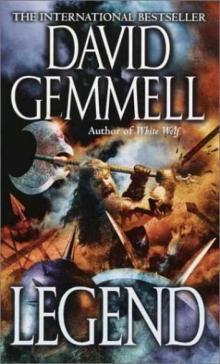 Drenai Saga 01 - Legend
Drenai Saga 01 - Legend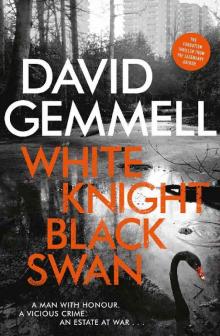 White Knight/Black Swan
White Knight/Black Swan![[Troy 02] - Shield of Thunder Read online](http://i1.bookreadfree.com/i/03/19/troy_02_-_shield_of_thunder_preview.jpg) [Troy 02] - Shield of Thunder
[Troy 02] - Shield of Thunder Lord of the Silver Bow t-1
Lord of the Silver Bow t-1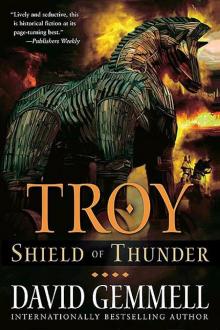 Shield of Thunder t-2
Shield of Thunder t-2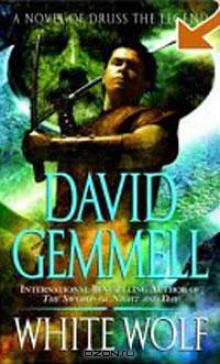 White Wolf: A Novel of Druss the Legend dt-10
White Wolf: A Novel of Druss the Legend dt-10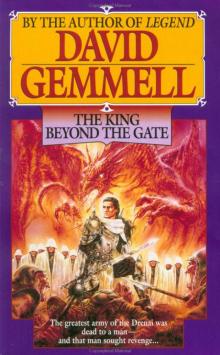 Drenai Saga 02 - The King Beyond the Gate
Drenai Saga 02 - The King Beyond the Gate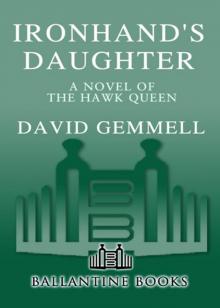 Ironhand's Daughter
Ironhand's Daughter Gemmell, David - Drenai 06 - The First Chronicles of Druss the Legend
Gemmell, David - Drenai 06 - The First Chronicles of Druss the Legend The Last Guardian
The Last Guardian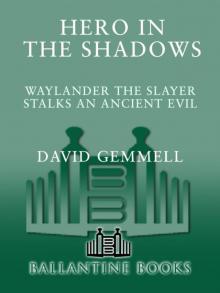 Hero in the Shadows: A Waylander the Slayer Novel
Hero in the Shadows: A Waylander the Slayer Novel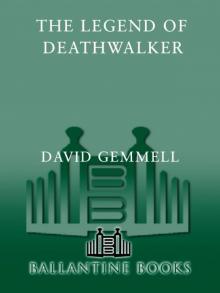 The Legend of the Deathwalker
The Legend of the Deathwalker